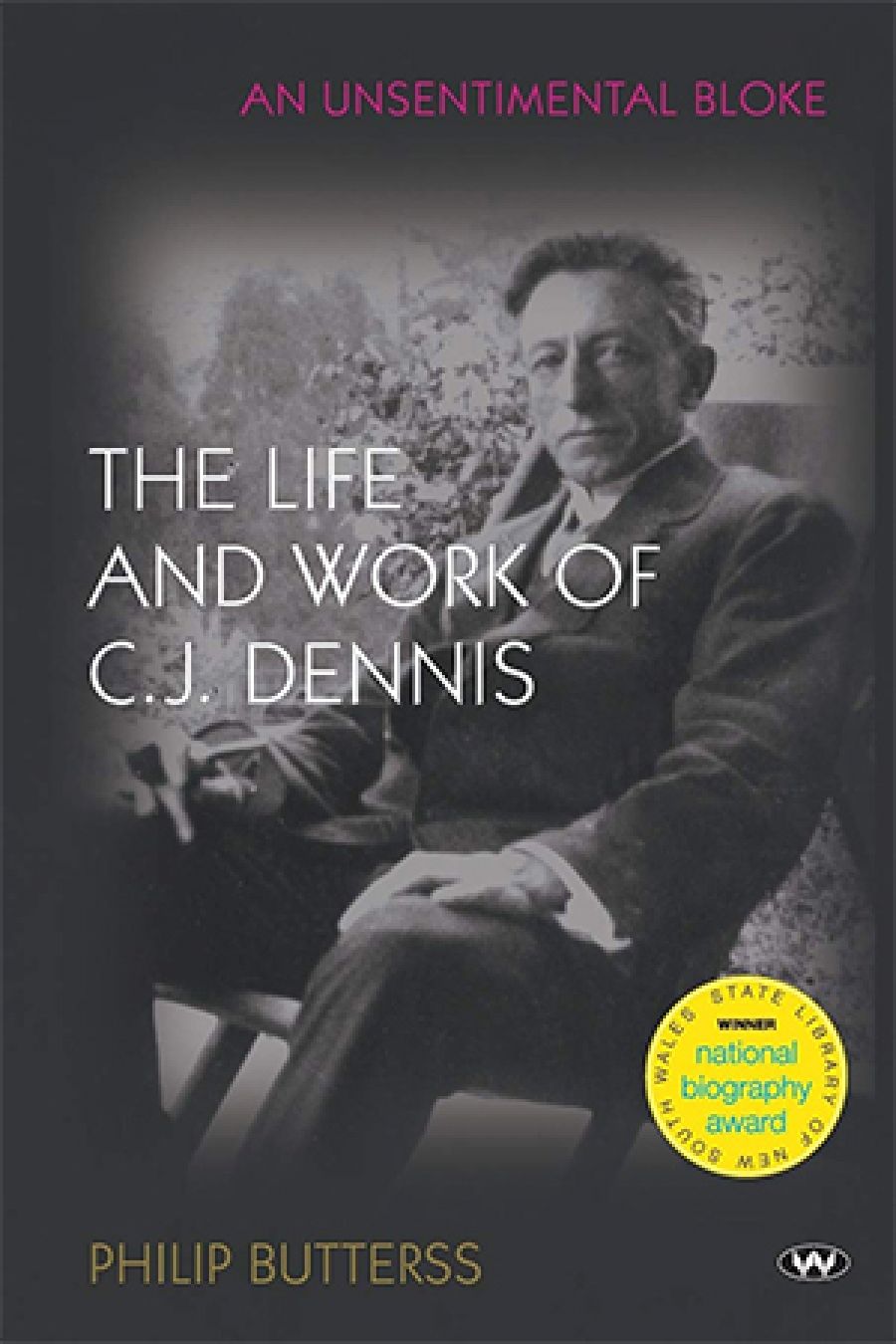
- Free Article: No
- Contents Category: Biography
- Review Article: Yes
- Online Only: No
- Custom Highlight Text:
Now and again it is good to remind ourselves that literary history (and I think the history of the other arts) is strewn with the names of those who had great stature in their own time and are now largely forgotten, and with the names of others for whom the reverse is true. William Blake, short of money, went to work for the much more admired poet William Hayley. These days, the name ‘William Hayley’ will only conjure up ‘Rock Around the Clock’. Even Samuel Johnson, perhaps the greatest of all literary critics, thought Abraham Cowley ‘undoubtedly the best’ of the Metaphysical poets, and it took three hundred years for John Donne’s reputation to be firmly established.
- Book 1 Title: An Unsentimental Bloke
- Book 1 Subtitle: The life and work of C.J. Dennis
- Book 1 Biblio: Wakefield $34.95 pb, 289 pp
Academic literary study once focused Leavis-like on the great writers, but over the last few decades members of the Association for the Study of Australian Literature have shifted attention to the broader literary landscape. Philip Butterss has continued this trend with a long overdue critical biography of C.J. Dennis. Dennis and Paterson have a sense of humour that does keep their names alive as writers for children; there is, I think, no hope of saving Gordon. Rereading Dennis’s A Book for Kids (1921) shows just how witty, skilful, and entertaining he could be. This is also true of The Glugs of Gosh (1917), which, Butterss notes, mixes with the children’s verse some adult satire, delivered in a ‘kindly’ way. Butterss notes the Swanks: ‘They lurk in every Gov’ment lair, / ’Mid docket dull and dusty file, / Solemnly squat in an easy chair, / Penning a minute of rare hot air / In departmental style.’
Dennis’s wife, Olive, thought The Glugs ‘his best work’ and this seems an astute judgement. It is not, however, the work that made him famous and which Butterss tells us ‘still holds the position of bestselling book of Australian poetry … well over 300,000 copies’. That was The Songs of a Sentimental Bloke (1915). Making good use of Olive’s reminiscences and conducting thorough research, Butterss deftly traces its origins, its rise to celebrity status, and its engendering of sequels – one of Australia’s greatest silent films, a talkie, a musical, a stage play, and a ballet. Butterss argues that it shifted bushman values into the city, helped create the Anzac legend, and ‘paved the way for Ray Lawler’s Summer of the Seventeenth Doll’. Walter Murdoch called Dennis ‘our one satirist of genius’; Vance Palmer said he was ‘perhaps the most highly skilled writer of light verse of his day, here, or in any other country’. Butterss shows that many saw him as ‘the unofficial poet laureate of Australia’ and, on Dennis’s death, Prime Minister Joseph Lyons followed others in saying ‘he will … become the Australian Robbie Burns’. Yet ‘a fund for a Dennis memorial launched in the Herald five months later ‘failed to attract much support’. Now his work is ignored in Australian universities’ teaching of Australian literature and in literary discussions; even Butterss concentrates more on the ‘Life’ than on the ‘Work’.
What happened? I own copies of The Sentimental Bloke and Doreen (1917) and attempted to read them for this review, but failed. The attempt to read more than a few pages of larrikin-speak is nowadays doomed. Butterss observes that ‘As the nation increasingly considers itself to be multicultural, cosmopolitan, sophisticated, and at the forefront of contemporary global trends, Dennis’s version of Australianness has less and less appeal.’ Australian society has changed enormously since Dennis’s day, when the Bloke could describe his ‘tart’ as a ‘precious bit o’ fluff’ and Egyptians as ‘niggers’. Before contemporary readers get on a moral high horse we need to recognise that in all Dennis’s writing there is a kind of innocence as well as insularity and narrowness.
Nevertheless, Dennis is not even read in relation to his own time, as Lawson is. It is Lawson who has become our Robert Burns. Lawson’s stories – not his poems – have a subtle presentation of human psychology that applies to the Bush era and beyond. Dennis’s work seems more forced, and it lacks any psychological depth or intensity. Like Paterson, he works best with humour and satire.
Butterss covers all this territory with clarity, balance, intelligence, and professionalism. He is straightforward about Dennis’s personal strengths and weaknesses and about the many contradictions in his character. The poet of the people stares out from the book’s cover with severe aloofness. In Dennis’s own time he was identified by readers with the Bloke, an illusion that Dennis cultivated for commercial reasons, but Butterss details their enormous differences. Dennis was a binge drinker and had the alcoholic’s obsessive personality, but he was incredibly versatile – as a builder, plumber, gardener, musician, brewer, cricketer, pigeon breeder, and even to some extent as a bushman. It is his poetry that could have done with more versatility, although his metrical skill is unquestionable. It is striking that that other Irish–Australian drinker poet, Christopher Brennan, was his contemporary – could any two poets be more different? Philip Butterss puts the case that Dennis ‘could certainly write great verse’ of a popular kind, and he presents ‘Den’ as a fascinating character. The book’s production values match the high standard of its contents; Butterss has performed a service not just for Dennis but for Australian literature generally.


Comments powered by CComment